One Nation, One Election
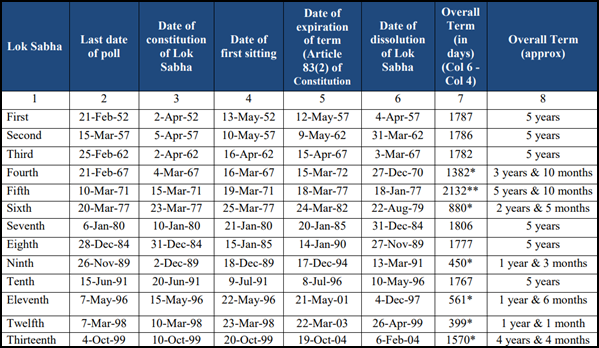
- 19 Dec 2024
In News:
The government has recently taken steps to implement "One Nation, One Election" by presenting two Constitution Amendment Bills in the Lok Sabha: the One Nation One Election – The Constitution 129th Amendment Bill 2024 and the Union Territories Laws Amendment Bill 2024.
Introduction to the Concept:
- Objective: Proposes synchronizing elections for Lok Sabha (national) and State Legislative Assemblies to be held on the same day.
- Purpose: Aims to reduce costs, minimize logistical challenges, and address governance disruptions caused by frequent elections.
- 2024 Report: The High-Level Committee Report on Simultaneous Elections, released in December 2024, outlines a roadmap for implementing this reform.
Historical Background:
- Previous Practice: From 1951 to 1967, Lok Sabha and State Assembly elections were conducted together.
- Disruptions: The practice was interrupted due to premature dissolutions and emergencies, leading to staggered elections across India.
High-Level Committee on Simultaneous Elections:
- Committee Formation: Headed by former President Ram Nath Kovind, formed on 2nd September 2023.
- Public Response: Over 21,500 responses, with 80% in favor.
- Political Party Responses: 32 political parties supported the idea, while 15 raised concerns about regional party marginalization.
- Expert Consultations: Majority of experts supported the reform, emphasizing resource optimization and reduced disruptions.
Committee Recommendations:
- Constitutional Amendments: Proposals to amend Articles 82A and 324A to enable simultaneous elections.
- Two-Phase Implementation:
- Phase 1: Synchronize elections for Lok Sabha and State Legislative Assemblies.
- Phase 2: Include Municipalities and Panchayats within 100 days.
- Single Electoral Roll: Creation of a unified electoral roll and EPIC for all levels of elections, reducing duplication and errors.
Rationale for Simultaneous Elections:
- Governance Consistency: Reduces focus on election preparation, allowing more attention to developmental work.
- Prevents Policy Paralysis: Mitigates disruptions caused by the Model Code of Conduct (MCC) during frequent elections.
- Resource Optimization: Reduces the need for personnel and resources for election duties, allowing better allocation to governance tasks.
- Preserves Regional Party Relevance: Local issues remain prioritized, ensuring regional parties' concerns are heard.
- Equitable Political Opportunities: Encourages diversification and inclusivity within political parties.
- Financial Benefits: Reduces the financial burden of conducting multiple elections, enhancing economic efficiency.
Conclusion:
- The concept of "One Nation, One Election" is a significant reform aimed at streamlining India's electoral processes. With broad public and political support, it promises improved governance, cost savings, and better resource management in the future.
One Nation, One Election Bill
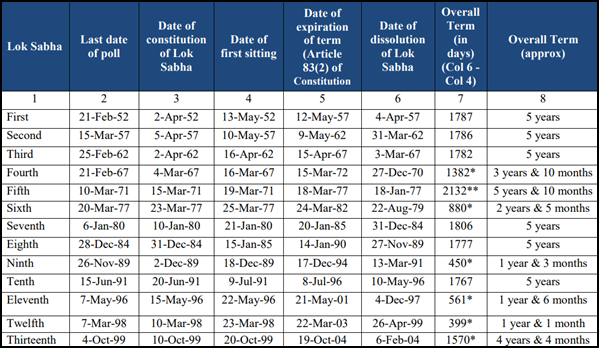
- 13 Dec 2024
In News:
The One Nation, One Election Bill has made significant progress in India, passing the Lok Sabha with 269 votes in favor and 198 votes against. The bill proposes the synchronization of elections for the Lok Sabha, State Legislative Assemblies, and local bodies (Panchayats and Municipalities), aiming to streamline the electoral process, reduce costs, and enhance governance.
Key Updates:
- The bill has been approved by the Union Cabinet and will be reviewed by a Joint Parliamentary Committee (JPC), whose report will be presented for further approval and discussion in Parliament.
- The process will unfold in two phases:
- Phase 1: Simultaneous elections for the Lok Sabha and State Legislative Assemblies.
- Phase 2: Synchronizing local body elections (Panchayats and Municipalities) within 100 days of the general elections.
Historical Context:
- 1951-1967: India previously conducted simultaneous elections for the Lok Sabha and State Assemblies until disruptions, such as premature dissolutions of assemblies, led to staggered elections after 1967.
- The One Nation One Election concept has been revived to address inefficiencies in the current system, especially the high cost of conducting frequent elections.
Advantages of the One Nation, One Election Bill:
- Cost Reduction: Synchronizing elections can significantly lower the financial burden by eliminating the need for multiple election cycles, reducing the deployment of resources like security personnel and election staff.
- Long-Term Governance Focus: Politicians can prioritize governance and policy implementation rather than election campaigning, fostering long-term stability.
- Increased Voter Turnout: Voter fatigue, caused by frequent elections, may reduce, leading to higher turnout as elections occur less often.
- Fairer Political Competition: Smaller regional parties could have a better chance to compete with larger national parties by reducing election-related costs.
- Efficient Use of Resources: Security forces and administrative resources can be deployed more effectively, avoiding the redundancy caused by multiple election cycles.
Disadvantages of the One Nation, One Election Bill:
- Synchronization Challenges: Aligning elections across a vast and diverse country like India, especially in states with unstable political situations, may prove difficult.
- Federalism Concerns: The implementation may require constitutional changes that could impact India's federal structure, potentially limiting the autonomy of states in election matters.
- Impact on Regional Issues: National issues could overshadow regional concerns, diluting the focus on state-specific matters.
- Challenges for Regional Parties: Larger national parties may dominate the electoral landscape, reducing the influence of regional parties and undermining the federal nature of the political system.
- Accountability Risks: Fixed terms without frequent elections might reduce public scrutiny of elected officials, affecting their accountability.
Constitutional Amendments Required:
The implementation of One Nation, One Election requires amendments to several key constitutional provisions:
- Article 83: Regarding the duration of the Lok Sabha, amendments are needed to synchronize the timing of dissolution.
- Article 85: Deals with the sessions and dissolution of Parliament, which needs to be aligned with the new system.
- Article 172: Pertains to the duration of State Legislatures, requiring amendments for synchronization.
- Article 174: Similar to Article 85, it governs the sessions and dissolution of State Legislatures, needing standardization.
Implementation Challenges:
- Logistical Complexity: Conducting simultaneous elections would require immense logistical coordination, including vast numbers of electronic voting machines and trained personnel.
- Political Accountability: Fixed terms may reduce the accountability that frequent elections bring, potentially leading to governance stagnation.
- Impact on Federalism: Amendments to the Constitution regarding state legislatures might face resistance from states concerned about their autonomy.
One Nation, One Election
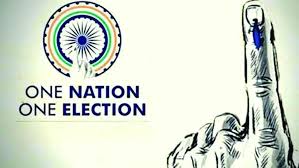
- 19 Sep 2024
In News:
The Union cabinet has recently approved the "One Nation, One Election" proposal, facilitating the conduct of simultaneous elections in India. This initiative follows a report submitted in March by a high-level committee chaired by former President Ram Nath Kovind, which unanimously recommended synchronizing Lok Sabha and State Assembly elections, along with local body polls, within 100 days.
What are Simultaneous Polls?
Simultaneous polls aim to align the timing of Lok Sabha and State Assembly elections across all states, thereby reducing the frequency of elections. Historically, simultaneous elections were held during the first four general election cycles (1952, 1957, 1962, and 1967), but this practice ended in 1959 after the dismissal of the Kerala government. Since then, due to premature dissolutions of various Assemblies, elections have been staggered. Currently, only four states—Andhra Pradesh, Odisha, Arunachal Pradesh, and Sikkim—hold simultaneous elections with the Lok Sabha.
Arguments For and Against
Proponents argue that simultaneous elections can significantly reduce election-related costs, which amounted to approximately ?3,870 crore during the 2014 general elections. They also highlight that the Model Code of Conduct triggers twice in a five-year cycle, leading to extended periods of governance downtime.
Opponents caution that this approach may favor larger political parties with national reach, potentially sidelining smaller regional parties. A 2015 study found that the likelihood of a party winning both Lok Sabha and Assembly elections when held simultaneously is 77%, dropping to 61% if elections are spaced six months apart.
Implementation Process
The committee proposed a two-step implementation:
- Simultaneous Elections: Conduct elections for both the Lok Sabha and State Legislative Assemblies together.
- Synchronizing Local Elections: Hold elections for municipalities and panchayats within 100 days following the general elections.
Following the announcement of the "appointed date," the terms of all State Assemblies constituted after that date would end with the Lok Sabha's term. This could lead to most State governments not completing their five-year terms, even if they maintain a majority.
Required Constitutional Changes
Several amendments to the Constitution have been proposed:
- Introduction of Article 82A: This would require all Legislative Assemblies elected after the appointed date to conclude with the Lok Sabha’s term.
- Amendment of Article 327: Expanding Parliament's powers to include the conduct of simultaneous elections.
- Revisions to Articles 83 and 172: Defining the five-year term as the "full term" and any remaining period after premature dissolution as the "unexpired term."
- Introduction of Article 324A: Empowering Parliament to ensure that municipality and panchayat elections occur alongside general elections.
- Amendments for Union Territories: Ensuring that Assembly elections in Union Territories align with simultaneous elections.
- Single Electoral Roll: Proposing a common electoral roll for all elections, to be managed by the Election Commission of India (ECI).
State Ratification
Under Article 368, amending the Constitution may require ratification by state legislatures. The panel believes that syncing Assembly elections with Lok Sabha elections will not need state ratification, but amendments for a common electoral roll and synchronization of local elections will require cooperation from the states. The ruling BJP, currently in power in several states, will need to navigate upcoming Assembly elections in Haryana, Maharashtra, and Jharkhand to secure this support.
Conclusion
The "One Nation, One Election" initiative aims to streamline India's electoral process, potentially enhancing governance and reducing costs. However, its success depends on achieving political consensus and implementing necessary constitutional amendments, which will require collaboration among various political parties and state governments.
Star Campaigners
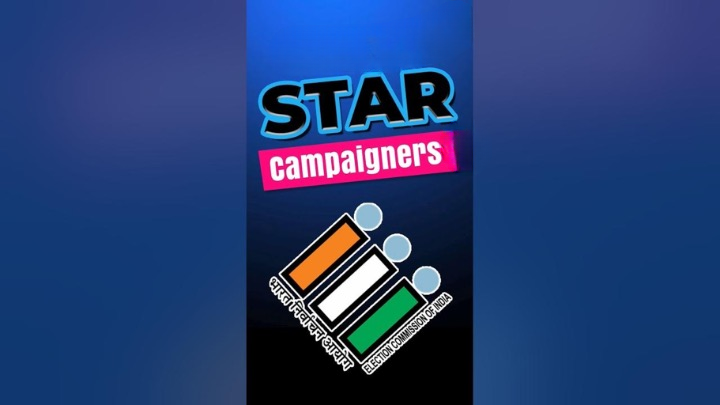
- 23 Apr 2024
Why is it in the News?
In the current general elections, political parties are selecting 'star campaigners' to lead their campaigns.
What are Star Campaigners in Election?
- Star campaigners are popular individuals with significant fan followings and are chosen by political parties to contest or campaign during elections.
Legal Provisions:
- The Representation of the People Act, 1951 (RPA) governs the expenditure incurred by 'leaders of a political party,' commonly referred to as star campaigners.
- A recognized political party (National or State) can appoint a maximum of 40-star campaigners.
- A registered unrecognized political party can appoint up to 20.
- The names of star campaigners must be communicated to the Election Commission (EC) and Chief Electoral Officer (CEO) within seven days from the date of election notification.
- For multi-phase elections, political parties can submit separate lists of star campaigners for different phases.
Expenses and Apportionment:
- If a star campaigner seeks votes for contesting candidates or shares the dais with them, rally/meeting expenses are apportioned to the election expenditure of those candidates.
- Boarding/lodging expenses incurred by the star campaigner while campaigning for candidates are included in the expenditure accounts of those candidates.
- If candidates travel with the star campaigner, 50% of the star campaigner's travel expenditure is apportioned to those candidates.
Special Cases:
- When a Prime Minister or former Prime Minister serves as a star campaigner, the government bears the expenditure on security, including bullet-proof vehicles.
- However, if the Prime Minister is accompanied by another star campaigner, the candidate must bear 50% of the expenditure on security arrangements.
Special Olympics Bharat
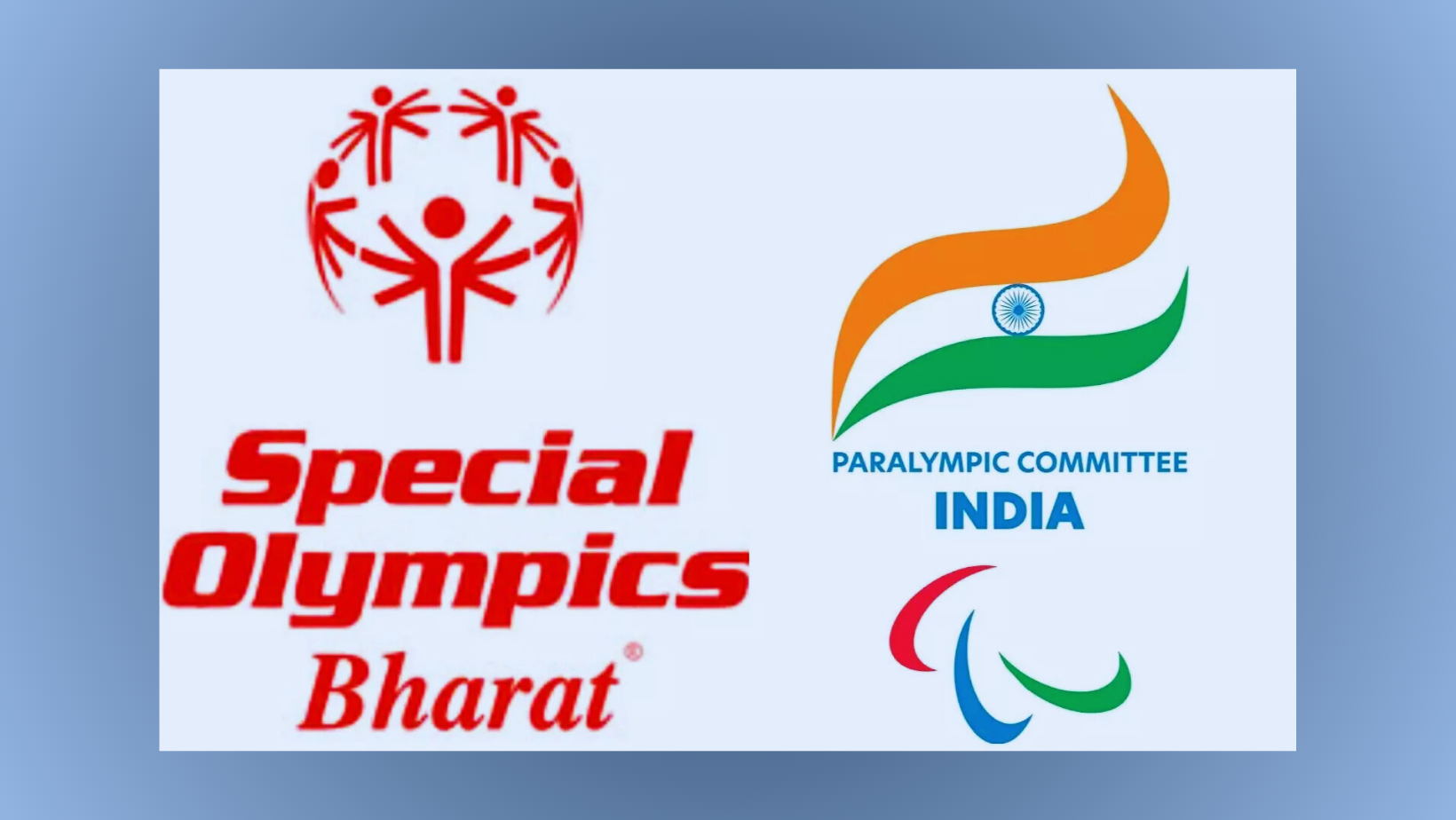
- 15 Apr 2024
Why is it in the News?
Special Olympics Bharat (SOB), a National Sports Federation of India is forming district units across Tamil Nadu through elections on April 22.
About Special Olympics Bharat:
- Special Olympics Bharat is a National Sports Federation also registered under the Indian Trust Act 1882 in 2001 and is accredited by Special Olympics International to conduct Special Olympics Programs in India.
- It is recognized by the Ministry of Youth Affairs & Sports, Government of India as a National Sports Federation in the Priority Category, for the development of Sports for Persons with Intellectual Disabilities.
- It is a designated Nodal Agency for all disabilities on account of its national presence and experience, especially in rural areas which account for nearly 75 percent of the disabled population in India.
- Mission: The mission of Special Olympics is to provide year-round sports training and athletic competition in a variety of Olympic-type sports for children and adults with intellectual disabilities, giving them continuing opportunities to develop physical fitness, demonstrate courage, experience joy, and participate in a sharing of gifts, skills, and friendship with their families, other Special Olympics athletes and the community.
- Special Olympics Bharat works towards the social acceptance of people with intellectual disabilities, whereby they are respected and given equal chances to become productive citizens.
- They encourage athletes to move from the Special Olympics training and competition into school and community programs where they can compete in regular sports activities.
Special Olympics Bharat strives to:
- Focus on holistic development and training that goes beyond the classrooms into the playing fields, cultural and community centers, to motivate children with disabilities to join and remain in school
- Create role models who will inspire the children and also motivate parents to send their children to school and to participate in sports and other extra-curricular activities
- Train teachers to sensitize them to the needs of special children, and create a cadre of physical education teachers from among the disabled who can work with schools and community centers
- Ensure maximum involvement of the community for greater public understanding and acceptance of people with intellectual disabilities.
- Ensure all Special Olympics Bharat activities local, state, national, and international reflect the Olympic movement values, standards, ceremonies, and events.
What is Intellectual Disability?
- Intellectual disability is a lifelong condition that affects a person’s intellectual skills and their behaviour in different situations.
- It can include difficulties in communication, memory, understanding, problem-solving, self-care, social and emotional skills, and physical skills.
- People with intellectual disability have the same feelings, rights, and aspirations as everyone else.
- Intellectual disability does not define who a person is, how they should be treated, or how they want to live.
- An IQ test determines whether a person has an intellectual disability. IQ scores lower than 70 indicate an intellectual disability.
SUVIDHA Portal
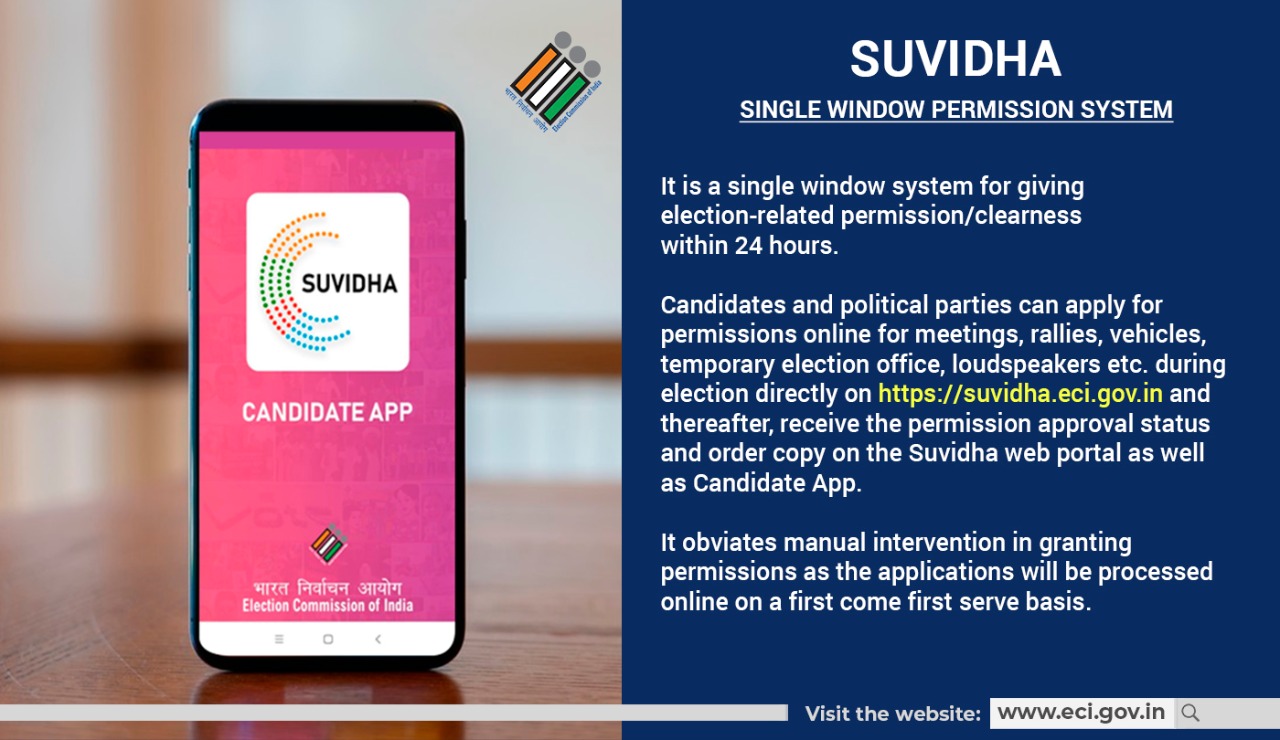
- 08 Apr 2024
Why is it in the News?
The Election Commission said that over 73 thousand applications had been received on the Suvidha Portal in just 20 days since the announcement of General Elections 2024.
About SUVIDHA Portal:
- The Suvidha portal is a technological solution developed by the Election Commission of India (ECI) to ensure a level playing field upholding the democratic principles of free, fair, and transparent elections.
- Suvidha's robust track record showcases its ability to streamline requests for permissions and facilities during election campaigns, catering to diverse needs such as rallies, canvassing, and temporary party offices.
- The Suvidha portal offers both online and offline submission options, ensuring inclusivity and equal opportunity for all stakeholders.
- Permission requests can be processed efficiently through a robust IT platform managed by nodal officers from various state departments.
- The portal's user-friendly design allows political parties and candidates to submit requests from anywhere, at any time.
- To enhance transparency and convenience, Suvidha also provides a companion app for real-time tracking of application statuses.
- Available on both iOS and Android platforms, the app ensures a seamless user experience.
- Moreover, the Suvidha portal promotes accountability by offering features such as real-time tracking, status updates, timestamped submissions, and SMS communication.
- Data collected on the Suvidha platform serves as a valuable resource for scrutinizing election expenditures, thereby promoting greater integrity in the electoral process.
- With Suvidha, the Election Commission of India demonstrates its commitment to facilitating a fair, efficient, and transparent electoral environment, granting equal access to all political parties and candidates seeking permissions and clearances during election campaigns.
Voter Verifiable Paper Audit Trail (VVPAT)
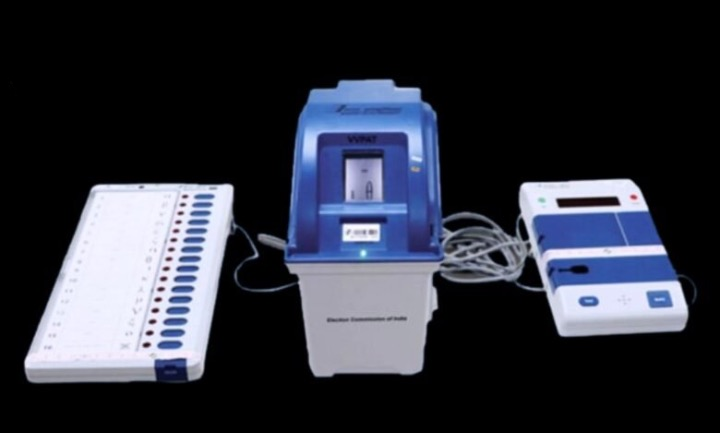
- 02 Apr 2024
Why is it in the News?
The Congress has hailed as an “important first step” the Supreme Court’s notice to the Election Commission and the Centre on a plea seeking a complete count of VVPAT slips and said the matter should be decided before the Lok Sabha polls commence.
What is the Voter Verifiable Paper Audit Trail (VVPAT)?
- The Voter Verifiable Paper Audit Trail, or VVPAT system, was first introduced in 2014 for the first time during the 2014 Lok Sabha Elections.
- The ECI conducted pilot tests of VVPAT systems in a few constituencies in 2011, and after successful trials, VVPAT was gradually deployed across all polling stations in subsequent elections.
- It is connected to Electronic Voting Machines (EVM) and enables voters to confirm that their votes were cast as intended.
- The concept of VVPAT was to enhance the credibility and transparency of EVMs.
What are VVPAT Slips?
- VVPAT slips are an integral part of the EVMs used in elections.
- It provides a physical paper trail for voters to verify that their vote has been correctly recorded by the EVM.
- It ensures transparency and accountability in the electoral process by allowing voters to verify their vote before casting it finally.
- The VVPAT produces a paper slip that permits the voter to confirm the accuracy of their vote on the EVM.
- This slip displays the name and symbol of the party chosen by the voter.
- Additionally, the machine features a transparent window through which the voter can observe the printed slip.
- Subsequently, the slip is securely deposited into a sealed compartment within the machine.
- However, in the event of a dispute, this sealed box can be opened for further examination.
Controversies Surrounding VVPAT:
- Despite its intended purpose of enhancing transparency, VVPAT has been subject to several controversies over the years.
- Some critics have raised concerns about the reliability of VVPAT systems, citing instances of malfunctioning printers, paper jams, and discrepancies between electronic and paper records.
- The Opposition parties within the INDIA bloc have been advocating for the full counting of VVPATs, to bolster public trust in the EVMs, which itself has been subjected to intense scrutiny recently.
- Their concern has mostly stemmed from allegations of delay in the printing and displaying of VVPAT slips for every vote, which they claim can significantly increase the time required for vote counting.
Supreme Court’s intervention in VVPATs:
- In April 2019, the SC asked the poll panel to increase the number of EVMs that undergo VVPAT physical verification from one to five per assembly segment in a parliamentary constituency.
- In the month of May the same year, the Supreme Court dismissed a writ petition seeking 100 percent counting of VVPAT in the 2019 Lok Sabha elections.
- Earlier in the same month, the Supreme Court had also dismissed the review petition filed by opposition parties to increase verification of VVPAT-EVM to 50 percent.
C-Vigil App
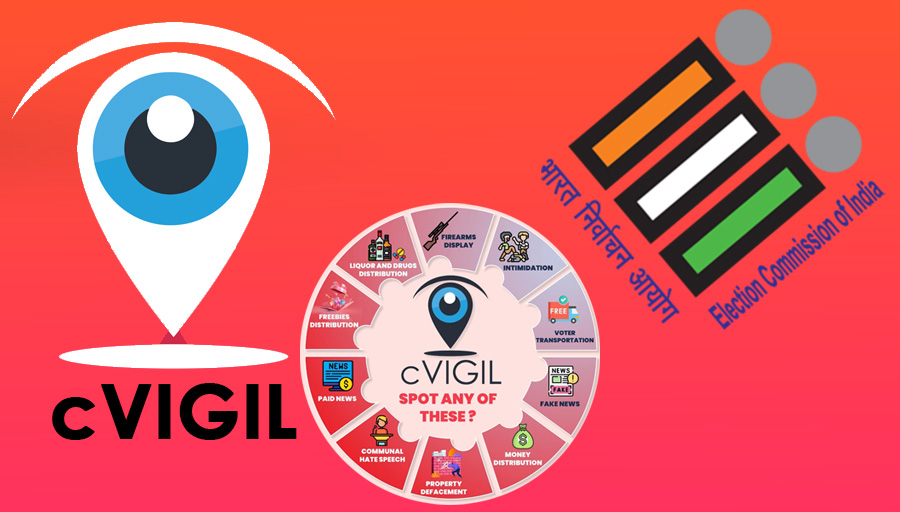
- 30 Mar 2024
Why is it in the News?
Ever since the general election was announced two weeks ago, a total of 79,000 violations have been reported on the Election Commission of India’s (ECI) cVigil app across the country.
About C-Vigil App:
- cVigil is a user-friendly and easy-to-operate application, that connects vigilant citizens with the District Control Room, Returning Officer and Field Unit (Flying Squads), or Static Surveillance Teams.
- By using this app, citizens can immediately report incidents of political misconduct within minutes and without having to rush to the office of the returning officer.
- As soon as the complaint is sent on the cVigil app, the complainant receives a unique ID, through which the person will be able to track the complaint on their mobile.
- This creates a rapid and accurate reporting, action, and monitoring system.
The cVIGIL app enabled voters to
- Register Complaints: The app allows every citizen within the election boundaries to report the Model Code of Conduct / Expenditure Violations by taking photos/audio/video through their mobile phones by signing into the application.
- Anonymous User: The app also allows the citizen to complain anonymously, without revealing their details/ identity.
- Geotagging: The app automatically enables a geo-tagging feature when users switch on their camera in the cVIGIL to report a violation, which helps the field unit to know the precise location of the incident.
Benefits of the Application:
- cVIGIL is a convenient and user-friendly app allowing citizens to send pictorial evidence of the model code of conduct violations in their vicinity.
- Each reported incident is tracked and scrutinized from the beginning to the endpoint, thus bringing accountability into the system.
- The immediate location verification feature of the cVIGIL will act as a strong deterrence for miscreants and wrong-doers as they can be easily tracked.
- A combination of all these factors will encourage citizens to keep vigil over unhealthy electoral practices and bring them to the notice of the Election Commission.
- This in turn will help the commission reach its objective of conducting free and fair elections.
Armed Forces (Special Powers) Act (AFSPA)
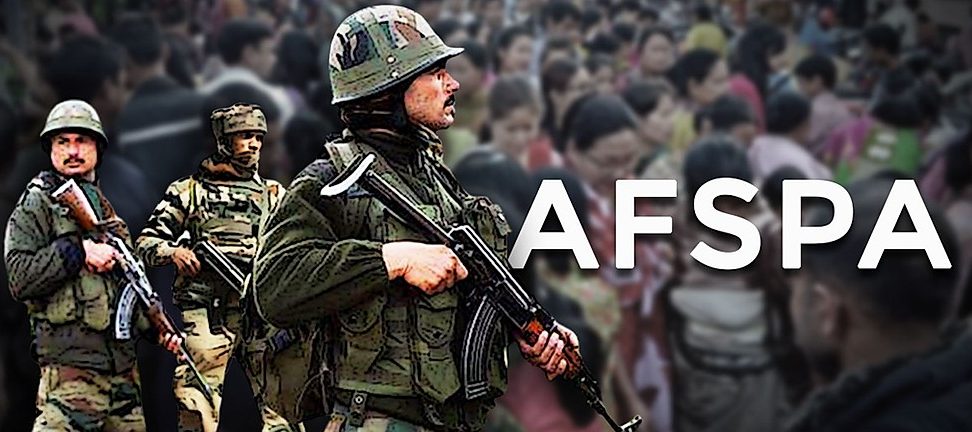
- 27 Mar 2024
Why is it in the News?
Union Home Minister Amit Shah has said the Jammu and Kashmir Assembly elections will be held before September and that the Centre will consider revoking the Armed Forces (Special Powers) Act there.
What is AFSPA?
- The AFSPA empowers the armed forces to uphold law and order in “disturbed areas.”
- They have the right to prevent a gathering of five or more people in a given location, use force, or even open fire after providing a sufficient warning if they believe someone is breaking the law.
- Armed forces are also permitted to enter and search any location if they suspect illegal activity.
- According to the AFSPA Act, the Army also has the authority to detain someone without a warrant, seize weapons and ammunition, and offer protection to someone acting in good faith.
Salient features of the AFSPA Act:
- The Central Government or the Governor of a State has the right to declare all or a part of any state to be a disturbed region if they believe it is necessary to stop the terrorist activity or any other activity that could jeopardize India’s sovereignty or be disrespectful to the national anthem, flag, or constitution.
- According to Section 3 of the AFSPA, the Central Government may send out armed forces to support the civilian authorities if the governor of a state publishes a formal announcement in the Gazette of India.
- According to the Disturbed Areas Act of 1976, a territory must maintain the status quo for a minimum of three months after being designated “disturbed.”
- Section (4) of the AFSPA grants army officers specific authority to shoot the only requirement is that the officer must sound the alarm before firing.
- Security forces have the authority to search without permission and arrest anyone without a warrant.
- After being taken into custody, a person must be delivered to the closest police station as soon as possible.
- The Central Government must first provide its consent before prosecuting an on-duty officer for alleged human rights violations.
What are the “Disturbed areas” under the AFSPA Act?
- The state governor, the administrator of the union territory, or the central government may declare a region as a “disturbed area” by publishing a notice in the official gazette, the entire territory or an order to implement it may be declared disturbed.
- It is up to the state governments to decide whether or not to implement the Act.
- However, the governor or the Center may disregard their judgment under Section (3) of the Act.
- The state governor was the only person with the authority to confer AFSPA when the act came into force in 1958.
- The 1978 amendment granted the central government this authority.
List of states that implement the AFSPA Act:
- Four states and one union territory currently have AFPSA activities, while 12 districts are still partially subject to the act, and 31 districts have fully implemented the law.
The AFSPA states include:
-
- Jammu & Kashmir
- Nagaland
- Assam
- Arunachal Pradesh
- Manipur
District Election Management Plan
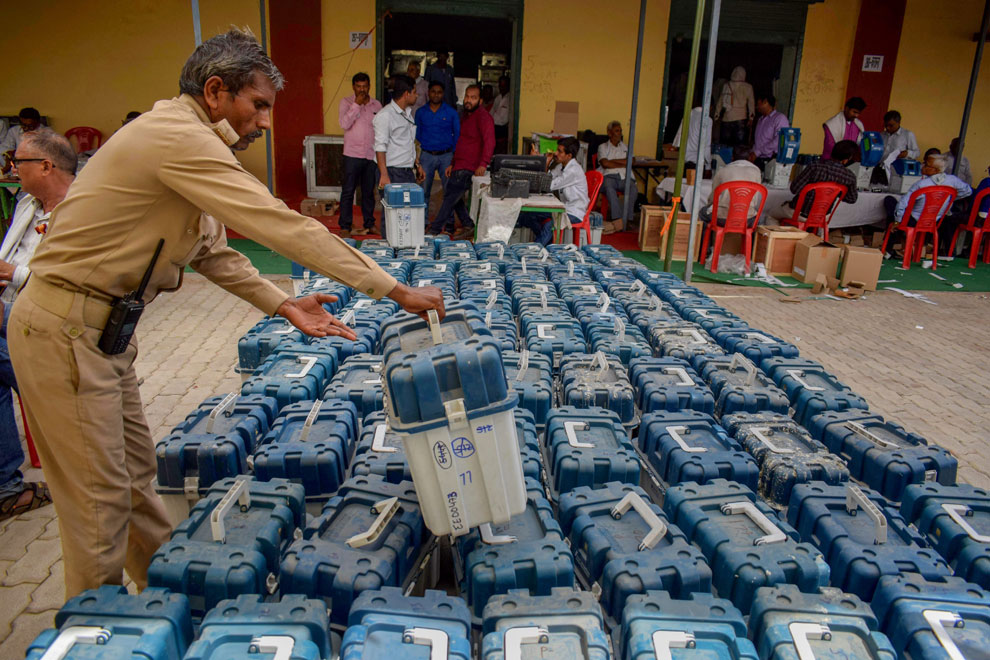
- 26 Mar 2024
Why is it in the News?
Effective execution of elections demands thorough planning, where a crucial aspect is the meticulous formulation and implementation of the District Election Management Plan (DEMP).
About the District Election Management Plan (DEMP):
- The District Election Management Plan (DEMP) is a comprehensive document designed to ensure the smooth conduct of elections, employing statistics and analysis.
- According to the Election Commission of India, the DEMP must be prepared at least six months before the tentative poll day.
- Collaboration among election officials, administrative authorities, law enforcement agencies, etc., is crucial for the execution of the DEMP.
Key components of the DEMP include:
- District Profile: A district profile providing foundational electoral strategy, featuring political maps outlining constituencies, key demographic and infrastructure statistics, and a brief on the district’s administrative setup and socio-economic features.
- Polling Stations: Detailed strategies for enhancing the availability and accessibility of polling stations, ensuring essential facilities such as ramps, electricity, lighting, drinking water, toilets, and internet connectivity.
- Special Attention to PwD and Senior Citizens: Addressing the requirements of voters with disabilities and senior citizens through dedicated help desks, round-the-clock control rooms, home voting options, and advanced postal ballot voting for essential service personnel.
- Systematic Voters’ Education and Electoral Participation (SVEEP) Plan: Integration of the Systematic Voters’ Education and Electoral Participation (SVEEP) plan, focused on increasing electoral participation.
-
- Planning, training, welfare, and deployment strategies for election personnel, along with training initiatives for district-level teams to enforce the Model Code of Conduct (MCC) and equip all election personnel with the necessary skills and knowledge.
Regarding Electronic Voting Machines (EVMs)?
- Management of Electronic Voting Machines (EVMs) is vital to uphold the integrity of the electoral process, encompassing strategies for secure storage, availability, transportation, and maintenance of both EVMs and Voter Verifiable Paper Audit Trails (VVPATs).
- The District Election Management Plan (DEMP) contributes to enhancing the voting process by ensuring its organization and accessibility to all voters.
- Furthermore, the principles employed in the DEMP, such as meticulous planning, collaboration, and transparency, offer valuable insights applicable beyond elections, providing lessons for broader governance.
- The emphasis on advanced planning, data-driven decision-making, and stakeholder collaboration highlighted by the DEMP is instrumental in addressing challenges effectively.
Minimum age to cast postal ballots hiked to 85 years
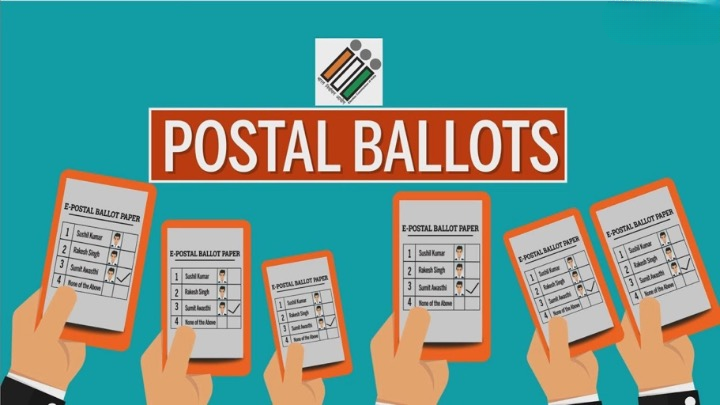
- 02 Mar 2024
Why is it in the News?
For the upcoming Lok Sabha and State Assembly elections, senior citizens who are 85 years and older will be able to opt for postal ballots as the government recently amended the rule to increase the eligibility from the current limit of 80 years and above.
News Summary:
- The government, in collaboration with the Election Commission, has introduced amendments to the Conduct of Election Rules (1961), specifically targeting the eligibility criteria for voting by postal ballot.
- Notably, the minimum age for senior citizens eligible for postal voting has been increased from 80 years to 85 years.
- Previously, Rule 27A of the Conduct of Election Rules had extended the postal ballot facility to senior citizens above 80 years, persons with disabilities, poll officers, and individuals diagnosed with COVID-19.
- This provision was first implemented during the 2020 Bihar assembly polls, coinciding with the onset of the pandemic.
- Despite the initial extension of postal voting rights to senior citizens aged 80 and above, a subsequent review by the Election Commission revealed that only a small fraction, approximately 2-3%, of eligible voters in this age group opted for postal ballots.
- The majority preferred to physically visit polling stations to cast their votes.
- Considering the statistics indicating that the total number of senior citizens above 80 years stands at 1.75 crore, with 98 lakh falling within the age range of 80-85 years, the government deemed it necessary to amend the existing rule.
- This adjustment reflects a nuanced approach aimed at ensuring efficient electoral processes while addressing the preferences and needs of elderly voters.
What is Postal Voting?
- Postal voting is only available to a specific group of voters.
- By retyping her choices on the ballot paper and returning it to the inspection officer before counting, a voter can remotely cast her ballot using this feature.
Who Can Avail This?
- Armed forces members such as those in the Army, Navy, and Air Force, armed police officers serving outside their home states, government workers stationed outside of India, and their wives are only eligible to vote by mail.
Features:
- Voters may use this service from any location outside of the designated constituency.
- This system makes it easier to create voter electoral roll data for services.
- It has two layers of security, making it a secure system:
- 1. Downloading the encrypted electronically transmitted postal ballot (ETPB) file requires an OTP (one-time password).
- 2. To decrypt, print, and deliver ETPB, a PIN is necessary.
- By sending postal ballots electronically to eligible service voters, this system addresses the time constraint associated with mailing postal ballots.
- The specific quick response code ensures confidentiality and prevents the duplication of cast ETPB.
Concerned Raised by Political Parties:
- Parties argue that allowing voters 65 and older to cast postal ballots violates voting confidentiality since many of the population lacks education and may ask for help from others at various points, ultimately identifying their chosen candidate.
- Their exposure to "administrative influence or influence by the government or the ruling party" also results from this.
ENCORE (NewsOnAIR)

- 03 Nov 2023
Why in the News?
Recently, the Election Commission of India (ECI) has developed in-house software named ‘ENCORE’ designed for efficient candidate and election management.
About ‘ENCORE’:
- The Election Commission of India has designed in-house software for complete Candidate and election management through ‘ENCORE’ which stands for Enabling Communications on Real-time Environment.
- This provides a seamless facility for Returning Officers to process candidate nomination, affidavit, Voter turnout, counting, results and data management.
- The ENCORE counting application is an end-to-end application for returning officers to digitize the votes polled, tabulate the round-wise data and then take out various statutory reports of counting.
- An additional application, the ENCORE Scrutiny Application, allows Returning Officers to scrutinize online nominations submitted by candidates.
- This process involves verifying and marking the status of nominations as Accepted, Rejected, or Withdrawn, facilitating the creation of the final list of contesting candidates and symbol assignment.
- The ECI offers an online portal for candidate nomination and affidavit submission.
- Candidates can create accounts, complete nomination forms, submit security deposits, and plan their visits to the Returning Officer through this portal.
- The Candidate Affidavit portal is designed to display information about a candidate's financial assets and liabilities, offering transparency in candidates' financial disclosures.
- The ENCORE Nodal App serves as a platform for various government departments, including fire, education, police, environment, and CPWD, to issue 'no objection' certificates.
- These certificates are required before granting permission for political parties or candidates to hold rallies, road shows, and meetings, ensuring that all necessary clearances are obtained before public events.
Bill on Election Commission members’ Appointments (Indian Express)
- 11 Aug 2023
What is the News ?
A Bill is set to be introduced in the Rajya Sabha with the view of overturning the effect of the Supreme Court’s (SC) verdict on the appointment of the Chief Election Commissioner (CEC) and Election Commissioners (ECs).
Facts About:
- The Bill seeks to establish a committee of the Prime Minister, the Leader of Opposition in the Lok Sabha and a Cabinet Minister nominated by the PM for selecting members of the Election Commission of India (ECI).
- Current Procedure: Currently, the Law Minister suggests a pool of suitable candidates to the Prime Minister for consideration.
- The President makes the appointment on the advice of the PM.
- As per the Bill, a Search Committee headed by the Cabinet Secretary and comprising two other members, not below the rank of Secretary to the government, having knowledge and experience in matters relating to elections, shall prepare a panel of five persons who can be considered for appointment.
- Then, as per the Bill, a Selection Committee consisting of the Prime Minister, the Leader of Opposition in the Lok Sabha, and a Union Cabinet Minister to be nominated by the Prime Minister will appoint the CEC and other ECs.
Present structure to appoint CEC and ECs:
- Under Article 324 (2), the President appoints the CEC and other ECs.
- The President makes the appointment on the advice of the Union Council of Ministers headed by the Prime Minister.
- The Constitution does not prescribe any qualifications, academic or otherwise, for appointment to these offices.
- Tenure:
- The tenure of office and the conditions of service of all the commissioners is determined by the President.
- The tenure of commissioners is 6 years or up to the age of 65, whichever is earlier.
- The CEC and the two other ECs have the same powers and emoluments, including salaries, which are the same as a Supreme Court judge.
- All three commissioners have the same right of taking a decision. In case of a difference of opinion amongst the three members, the matter is decided by the Commission by a majority.
Process of removal:
- Article 324 of the Constitution of India mentions the provisions to safeguard and ensure the independent and impartial functioning of the Election Commission.
- The CEC is provided with security of tenure. He cannot be removed from his office except in the same manner and on the same grounds as a judge of the Supreme Court.
- Any other election commissioner or a regional commissioner cannot be removed from office except on the recommendation of the CEC.
Supreme Courts’ Judgment:
- On March 2, a five-judge bench of the Supreme Court unanimously ruled that a high-power committee consisting of the Prime Minister, Leader of Opposition in Lok Sabha, and the Chief Justice of India must pick the CEC and ECs.
- The judgement by a bench came in 2015, challenging the constitutional validity of the practice of the Centre-appointed members of the Election Commission.
- According to the judgement, the SC has now given the Opposition and the judiciary a say in the matter, ruling that the CEC and ECs must be appointed by the President on the advice of a committee comprising the PM, Leader of Opposition in Lok Sabha, and the Chief Justice of India.
- Also, in 2018, a two-judge bench of the SC referred the case to a larger bench since it required a close examination of Article 324 of the Constitution, which deals with the role of a Chief Election Commissioner.
Debate around appointment of CEC and ECs:
- Article 324(2) reads that “The Election Commission shall consist of the Chief Election Commissioner and such number of other Election Commissioners, if any, as the President may from time-to-time fix and the appointment of the Chief Election Commissioner and other Election Commissioners shall, subject to the provisions of any law made in that behalf by Parliament, be made by the President.”
- The Parliament has the power to nullify the effect of a Court ruling by addressing the concerns flagged in the judgment.
- In this case, the arrangement prescribed by the Supreme Court was specifically because the Court noted that there was a “legislative vacuum.” Filling that vacuum is well within the purview of the Parliament.
- However, the idea of an independent body that conducts elections permeates through the judgement.
- The Court repeatedly stated that to be the objective of the framers of the Constitution.
- The composition of the Selection Committee in the Bill raises questions on whether the process is now independent or still rigged in favour of the Executive.
Source: https://indianexpress.com/article/explained/explained-law/bill-election-commission-members-appointment-process-explained-8885676/#:~:text=The%20Centre%27s%20Bill%20seeks%20to,Commission%20of%20India%20(ECI).
